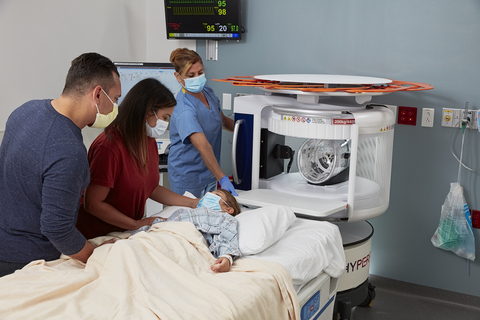Enrollment Completed for HOPE PMR Pediatric Hydrocephalus Study Using Hyperfine, Inc. Portable MR Imaging® System
Multi-site observational study seeks to redefine the standard of care for pediatric hydrocephalus management

(Photo: Business Wire)
Children living with hydrocephalus typically undergo at least two brain scans per year to monitor pressure in their enlarged brain ventricles and identify potential shunt malfunctions. With the aim of exploring a safer, more accessible solution for hydrocephalus patients, the HOPE PMR study is assessing the feasibility of integrating the Swoop® system, a brain imaging solution with zero ionizing radiation that is accessible at a child's bedside, into routine inpatient, outpatient, and emergency pediatric care settings. The study used pediatric hydrocephalus as an index condition to assess if Swoop® system images can be used to accurately detect shunt malfunctions and assess ventricular size.
"The Swoop® system represents a promising shift in brain imaging. We believe it has the potential to improve pediatric hydrocephalus management significantly," said Dr. Khan Siddiqui, chief medical officer and chief strategy officer at Hyperfine, Inc. "The insights gathered from this study will inform the viability of the Swoop® system in pediatric healthcare settings and patient care.”
Dr. Jeffrey Leonard, chief of Pediatric Neurosurgery at Nationwide Children’s Hospital, added, "With the completion of the enrollment phase of the study, we are now embarking on the critical task of data analysis and academic publication preparation. Our collaboration with Hyperfine, Inc. paves the way for improvements in brain imaging, benefiting this vulnerable patient population."
About Hydrocephalus
Hydrocephalus, marked by an abnormal buildup of cerebrospinal fluid in the brain, affects more than one million Americans. It particularly poses substantial challenges in pediatric care. Current treatments, such as the surgical placement of a shunt, experience an alarming failure rate of around
Although magnetic resonance imaging (MRI) is the preferred scanning modality due to its absence of ionizing radiation, practical constraints often limit its use. When MRI is unavailable, care providers must resort to computerized tomography (CT) scans, which carry notable risks. Published research indicates a single pediatric head CT scan could double the risk of radiation-associated malignancy2.
For more information about the Swoop® Portable MR Imaging® system, please visit hyperfine.io.
About Hyperfine, Inc. and the Swoop® Portable MR Imaging® System
Hyperfine, Inc. (Nasdaq: HYPR) is the groundbreaking medical technology company that created the Swoop® system, the world’s first FDA-cleared portable magnetic resonance imaging (MRI) system capable of providing brain imaging at the point of care. The Swoop® system received initial
The mission of Hyperfine, Inc. is to revolutionize patient care globally through transformational, accessible, clinically relevant diagnostic imaging and data solutions. Founded by Dr. Jonathan Rothberg in a technology-based incubator called 4Catalyzer, Hyperfine, Inc. scientists, engineers, and physicists developed the Swoop® system out of a passion for redefining brain imaging methodology and how clinicians can apply accessible diagnostic imaging to patient care. Traditionally, access to costly, stationary, conventional MRI technology can be inconvenient or not available when needed most. With the portable, ultra-low-field Swoop® system, Hyperfine, Inc. is redefining the neuroimaging workflow by bringing brain imaging to the patient’s bedside. For more information, visit hyperfine.io.
Hyperfine, Swoop, and Portable MR Imaging are registered trademarks of Hyperfine, Inc.
Forward-Looking Statements
This press release includes “forward-looking statements” within the meaning of the “safe harbor” provisions of the Private Securities Litigation Reform Act of 1995. Actual results of Hyperfine, Inc. (the “Company”) may differ from its expectations, estimates and projections and consequently, you should not rely on these forward-looking statements as predictions of future events. Words such as “expect,” “estimate,” “project,” “budget,” “forecast,” “anticipate,” “intend,” “plan,” “may,” “will,” “could,” “should,” “believes,” “predicts,” “potential,” “continue,” and similar expressions (or the negative versions of such words or expressions) are intended to identify such forward-looking statements. These forward-looking statements include, without limitation, the Company’s goals and commercial plans, the benefits of the Company’s products and services, and the Company’s future performance and its ability to implement its strategy. These forward-looking statements involve significant risks and uncertainties that could cause the actual results to differ materially from the expected results. Most of these factors are outside of the Company’s control and are difficult to predict. Factors that may cause such differences include, but are not limited to: the success, cost and timing of the Company’s product development and commercialization activities, including the degree that the Swoop® system is accepted and used by healthcare professionals; the impact of COVID-19 on the Company’s business; the inability to maintain the listing of the Company’s Class A common stock on the Nasdaq; the Company’s inability to grow and manage growth profitably and retain its key employees; changes in applicable laws or regulations; the inability of the Company to raise financing in the future; the inability of the Company to obtain and maintain regulatory clearance or approval for its products, and any related restrictions and limitations of any cleared or approved product; the inability of the Company to identify, in-license or acquire additional technology; the inability of the Company to maintain its existing or future license, manufacturing, supply and distribution agreements and to obtain adequate supply of its products; the inability of the Company to compete with other companies currently marketing or engaged in the development of products and services that the Company is currently marketing or developing; the size and growth potential of the markets for the Company’s products and services, and its ability to serve those markets, either alone or in partnership with others; the pricing of the Company’s products and services and reimbursement for medical procedures conducted using the Company’s products and services; the Company’s estimates regarding expenses, revenue, capital requirements and needs for additional financing; the Company’s financial performance; and other risks and uncertainties indicated from time to time in Company’s filings with the Securities and Exchange Commission, including those under “Risk Factors” therein. The Company cautions readers that the foregoing list of factors is not exclusive and that readers should not place undue reliance upon any forward-looking statements, which speak only as of the date made. The Company does not undertake or accept any obligation or undertaking to release publicly any updates or revisions to any forward-looking statements to reflect any change in its expectations or any change in events, conditions or circumstances on which any such statement is based.
1 https://www.hydroassoc.org/powerful-hydrocephalus-facts/
2 https://link.springer.com/content/pdf/10.1007/s00381-019-04345-3
View source version on businesswire.com: https://www.businesswire.com/news/home/20230809257907/en/
Media Contact
Jessica Stebing
Health+Commerce
jstebing@healthandcommerce.com
Investor Contact
Marissa Bych
Gilmartin Group LLC
marissa@gilmartinir.com
Source: Hyperfine, Inc.







